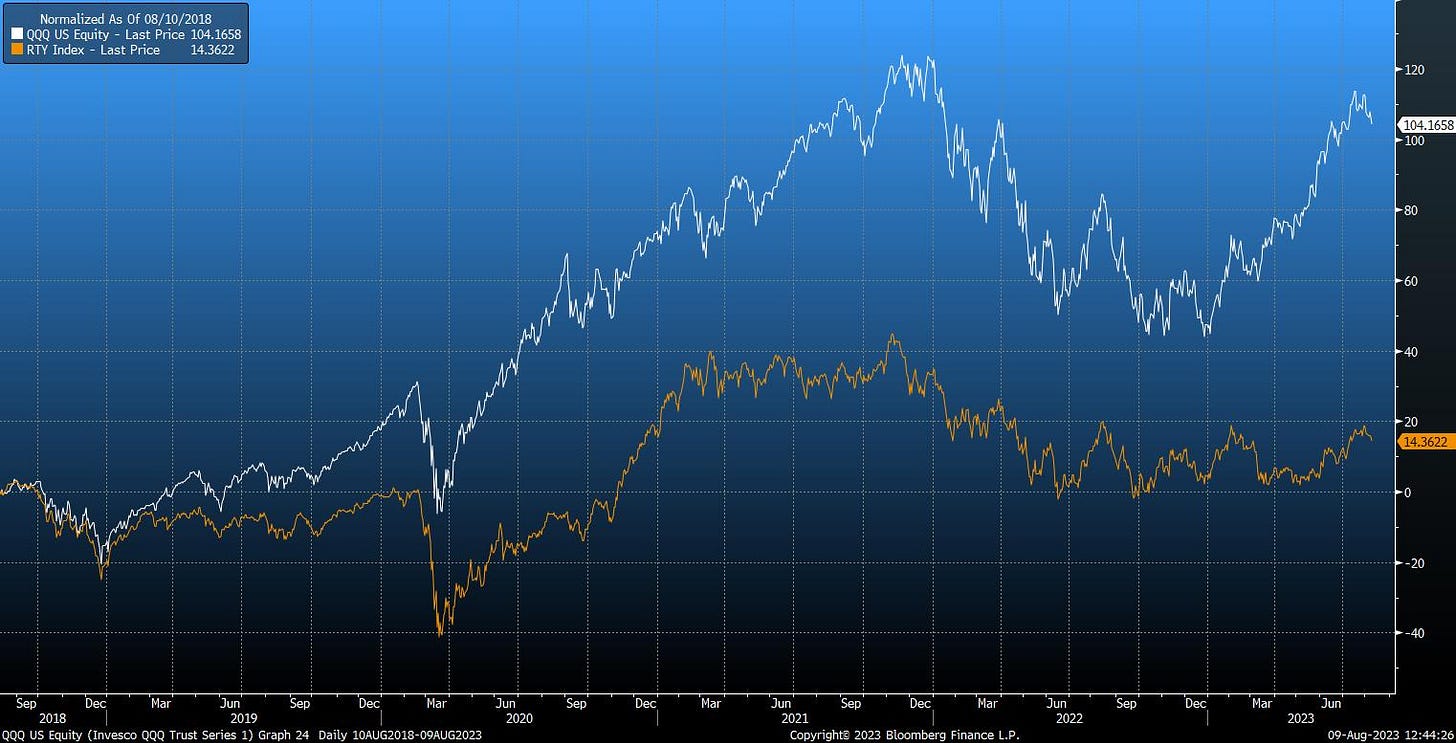Techniques Any Investor Can Use to Outsmart the Pros
(Part 1 of 2)
Professional investors typically have immense resources at their disposal, from teams of analysts who scour the world for investment ideas to databases of historical investment information. Often, they even have access to the CEOs of the companies they invest in (which [shameless plug] we can help you with through our podcast, The World According to Boyar). But individual investors have access to tools and techniques of their own, and in this two-part series, we’ll explain a couple of the techniques you can use to help you potentially make (and keep) money in the stock market.
Find an investing style that works for you, then stick with it—through thick and thin.
It has been a frustrating time for investors who concentrate on value-oriented and smaller-capitalization stocks. The Russell 1000 value index, for example, has dramatically underperformed its growth counterpart since the 2009 stock market bottom, advancing ~313% vs. ~725% for the Russell 1000 growth index.
Growth’s outperformance has led some pundits to announce the “death” of value investing, believing that the metrics underlying value investors’ decisions no longer apply. (Similar pronouncements were made during the dot-com mania, when age-old valuation indicators such as P/E were replaced with such tried and true valuation methodologies as “daily site visitors”.) In response, some prominent value investors, after underperforming for many years, have peppered their portfolios with expensive growth stocks, hoping to temporarily bolster their performance and quell client dissatisfaction. Such moves are eerily reminiscent of those seen in the late 1990s and 2000s, when once high-flying value managers threw in the towel and embraced growth investing—just in time to see the NASDAQ decline by almost 80%.
Investors in small-cap shares can tell a similar story. As Charley Grant notes in the Wall Street Journal, small-cap stocks (as measured by the Russell 2000) have lagged larger stocks by ~7% points annually over the past 5 years, bringing some of the worst relative returns since 1926. The returns of small cap shares in comparison to the Nasdaq 100 are even worse.
NASDAQ 100 5 Year Performance vs. Russell 2000 5 Year Performance
But as you’re probably aware, we tend to be contrarian by nature. In our view, both value shares and small & micro-cap shares offer some of the best risk/reward prospects in the stock market (for more on why, see our latest quarterly letter), and we’re not enamored with high-flying technology shares that have already priced in (or overpriced) years of expected growth.
Some companies that we are currently enamored with:
Townsquare Media (TSQ)
Townsquare Media has successfully transitioned its business from that of a radio broadcaster to a digital media company with over 50% of its profitability now coming from faster-growing digital sources (digital advertising, subscription-based website services, etc.)
Although the radio business is mature and slow growing, it remains a good cash generator for the Company.
Its radio markets serve communities outside metro areas where radio serves as a vital source for local news as many newspaper companies in its markets have closed.
The Company is shareholder friendly. Over the past ~2 years, it has repurchased a meaningful amount of shares (including a recent discounted purchase of $17 million from a large shareholder), reducing shares outstanding by about 20%.
The Company's current dividend (~8% yield) provides investors the opportunity to get paid until the market recognizes the Company’s transformation.
MSG Entertainment Corp (MSGE)
MSGE boasts a number of iconic assets (Madison Square Garden, Radio City Music Hall, the Beacon Theatre) that help generate significant recurring revenue streams, which should enable it to return a meaningful amount to shareholders in the form of dividends and share buybacks after paying down a portion of the debt assumed in the spinoff (it recently completed a spinoff of a business call Sphere Entertainment).
We believe that MSGE’s free cash flow (FCF) is poised to accelerate, as the Company’s venues are now operating at full capacity in what is (hopefully) a post-COVID-19 environment.
MSGE’s recurring revenue and capital-light business model enable it to throw off strong levels of FCF, which it will use to pay down debt while simultaneously bolstering future FCF (reduced interest expenses).
A recent restructuring completed by Old MSGE is expected to generate meaningful synergies and further bolster FCF. (You can find our analysis of the separation here.)
We estimate MSGE’s intrinsic value to be $45.08 or ~36% upside from current levels.
Comcast Corporation (CMCSA)
The company’s stock is down 26% from its 2021 high as investors have overreacted, in our view, to the Company’s broadband net additions, which have slowed substantially following a surge during the early part of the pandemic.
Although competition from fixed wireless access (FWA) is presenting near-term challenges, we believe that Comcast’s broadband business can withstand this competitive threat, and we note that the Company has successfully navigated competition from fiber over the past ~15 years.
At current levels, investors are effectively acquiring Comcast’s cable business at a discounted valuation and getting paid to own the Company’s non-cable business, including NBCU, which owns several top-notch entertainment businesses (theme parks, studios, etc.) that are worth~$24 a share.
Based on our sum-of-the-parts valuation, we derive a value of $77 a share, representing 71% upside from current levels.
The style of investing you use is less important than finding an investing framework that you are comfortable with, then never materially deviating from it.
The worst thing an investor can do is abandon an investment methodology because it isn’t producing the desired results right now, only to pivot to another one that has become long in the tooth (as we could argue is happening now, with growth investing and large-capitalization names having significantly outperformed value and small-caps for some time) and see it go into hibernation. Instead of worrying about how others are doing in the market, investors should be laser-focused on preserving and protecting their own capital. Measuring your performance against others’ results can tempt you to take on too much risk at precisely the wrong time. We’ve seen far too many money managers self-destruct trying to play catchup.
Individual investors have the luxury of ignoring how others are doing, unlike most professional investors, who have a financial incentive to boost short-term performance so they can draw and retain assets. Over the long term, however, this type of behavior can be detrimental to performance.
Everyone understands the fear of missing out, but don’t let it keep you from sticking to a framework that can help you turn the odds of success in your favor.
Stay tuned for part two. And if you have any questions or comments, don’t hesitate to reach out—we enjoy your feedback.
Important Disclosures. The information herein is provided by Boyar’s Intrinsic Value Research LLC (“Boyar Research”) and: (a) is for general, informational purposes only; (b) is not tailored to the specific investment needs of any specific person or entity; and (c) should not be construed as investment advice. Boyar Research does not offer investment advisory services and is not an investment adviser registered with the U.S. Securities and Exchange Commission (“SEC”) or any other regulatory body. Any opinions expressed herein represent current opinions of Boyar Research only, and no representation is made with respect to the accuracy, completeness or timeliness of the information herein. Boyar Research assumes no obligation to update or revise such information. In addition, certain information herein has been provided by and/or is based on third party sources, and, although Boyar Research believes this information to be reliable, Boyar Research has not independently verified such information and is not responsible for third-party errors. You should not assume that any investment discussed herein will be profitable or that any investment decisions in the future will be profitable. Investing in securities involves risk, including the possible loss of principal. Important Information: Past performance does not guarantee future results.
This information is not a recommendation, or an offer to sell, or a solicitation of any offer to buy, an interest in any security, including an interest in any investment vehicle managed or advised by affiliates of Boyar Research. Any information that may be considered advice concerning a federal tax issue is not intended to be used, and cannot be used, for the purposes of (i) avoiding penalties imposed under the United States Internal Revenue Code or (ii) promoting, marketing or recommending to another party any transaction or matter discussed herein. Clients of an affiliate of Boyar Research and employees of Boyar Research own shares Townsquare Media, Comcast, and Madison Square Garden Entertainment.





